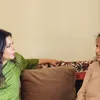HelpMeSee to receive India-targeted $25,000 grant from Goldman Sachs
The international non-profit will use the Goldman Sachs grant to provide training in cost-effective cataract surgery to eye-care practitioners in India.
HelpMeSee, an international non-profit focussed on eliminating cataract-caused blindness and vision impairment, will receive an India-targeted $25,000 grant from Goldman Sachs. The funding has come on the heels of the Goldman Sachs India team securing a grant through the annual, global Goldman Sachs Gives Analyst Impact Fund competition.
The initiative by the global analyst firm is a donor-advised fund through which Goldman Sachs and its current and retired senior employees provide grants to qualifying global non-profit organisations. The grant will be used by HelpMeSee to provide training in cost-effective cataract surgery for eye-care professionals in India.

L to R: Sheethal Rapheal, Ritu Yadav, Anshul Sanghavi, Prachi Mittal and Neha Saraf – Goldman Sachs’ analyst team from India representing HelpMeSee.
The funding for this cause was made possible by the efforts of a five-person analyst team in India that qualified to become one of six teams to advance to the finals of the global Goldman Sachs Gives Analyst Impact Fund competition.
The annual Analyst Impact Fund is an initiative that provides Goldman Sachs employees with the opportunity to collaborate with peers across global offices to win a grant for a non-profit organisation of their choice and impact the communities where they live and work.
Earlier in November, the finalists addressed their pitches and presentations to Goldman Sachs Chairman and CEO David Solomon and the firm’s Partnership Committee in New York.
The India team competed against 975 other analysts from around the world, who participated on behalf of 360 global non-profits. These projects were assessed for their impact, scalability, and uniqueness, the team’s analysis of the project goals and financials, and the strength of the organisation’s leadership and partnerships.
With a fourth-place finish, the India team secured the $25,000 grant for HelpMeSee India. The first-place grant of $250,000 was awarded to a London-based analyst team representing Days for Girls, an organisation that aims to increase access to menstrual care and education among girls and women.
Commenting on the company's annual initiative, Sonjoy Chatterjee, Chairman and Co-CEO of Goldman Sachs in India, said:
“The Analyst Impact Fund brings the very best of Goldman Sachs to our communities. This platform builds on our firm’s commitment to philanthropy and our longstanding culture of teamwork. For our analysts, the fund presents a unique opportunity to make a tangible impact on issues they are passionate about at an early stage of their career. We are proud that, year after year, we receive innovative and inspiring ideas from our talented analysts in our efforts to give back to society.”
HelpMeSee focusses on providing training for eye surgeons to treat cataracts. Through a cost-effective surgical training simulator, the specialists are trained in manual, small-incision cataract surgery (MSICS). The simulations train the specialists to handle diverse cases of cataracts, including hundreds of pre-existing conditions and complications that may be experienced during a live surgery.
This replaces traditional MSICS training, which was previously performed on live patients and associated with higher risks and economic costs; these adverse possibilities are drastically reduced with the improved procedure.
India is host to the largest population of blind people in the world, with over 20 million people affected by blindness due to cataracts. According to the National Blindness and Visual Impairment Survey India, from 2015 to 2019, cataracts have been the leading cause of blindness in people above 50 years of age.
In that age group, cataracts account for 66 percent of cases of blindness, 81 percent of severe visual impairment cases, and 70 percent of moderate visual impairment cases.
Today, the majority of cataract-afflicted Indians live in environments of low-income and poverty that lack access to healthcare services and suffer from low awareness about eye health and increased susceptibility to eye diseases.
(Edited by Athirupa Geetha Manichandar)








